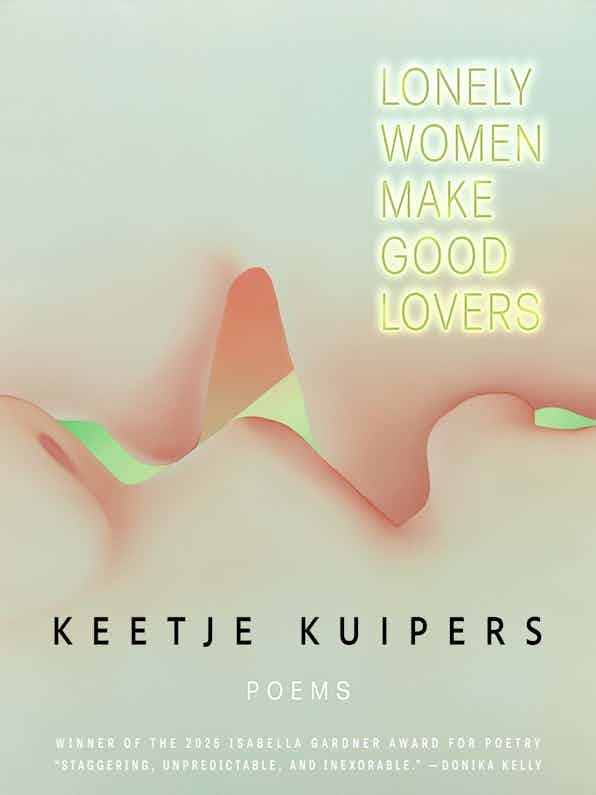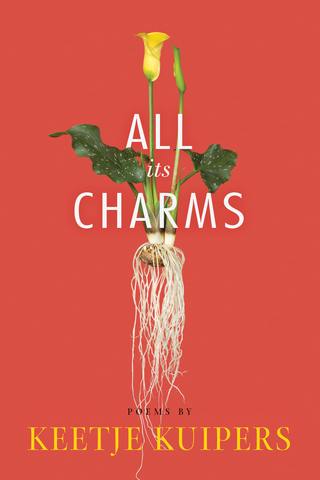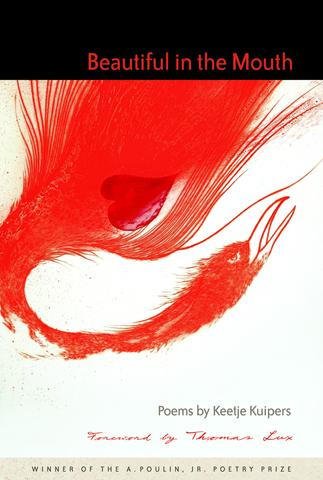

Keetje Kuipers
Award-winning Poet
Essayist, Story Writer, Editor



Readings &
Lecture Topics
- Love Poems to What’s Possible
- Writing into the Multitudes: Intersectional Identities
- The Poetics of Queer Kinship
- Oh Let Me Please: Writing the Best Sex (Poems) of Your Life
- DEI from the Inside Out: Restructuring the Heart of Your Organization
- How to Build Your Book of Poems (and Not Anyone Else’s)
- The Role of the Poet-Critic Today
- The Editor’s Inside Perspective
- Investigating Place: Writing through Re-Wilding
- Homespun: Navigating Family Connections in Poetry
- Down at Worm Level: The Poetics of Humility
Biography
“Keetje Kuipers’ poems are daring, formally beautiful, and driven by rich imagery and startling ideas.” —Tracy K. Smith
“Her vision is original, and her voice—precise, questioning, sensual, wry—is one I’d follow anywhere.” —Beth Ann Fennelly
“Kuipers’ voice haunts, indelible with mourning, grace, and an elegant wisdom.” —Dorianne Laux
“Kuipers’s narratives immerse us in the off-kilter, often surprising idiosyncrasies and contradictions of America, particularly in the places we go to see ourselves and our own country reflected.” —Kenyon Review
Keetje Kuipers is the author of four acclaimed books of poetry, as well as Editor-in-Chief of Poetry Northwest, one of the oldest and most well-respected literary journals west of the Mississippi. Her most recent book, Lonely Women Make Good Lovers (BOA Editions, 2025), is the winner of the Isabella Gardner Poetry Award. Lonely Women delves into the responsibilities we have to one another as relational beings, and the public and private performances of sexuality. Marilyn Hacker calls the collection “elegant, earthy, pertinent,” and poems from Lonely Women have already appeared in The New York Times Magazine, American Poetry Review, POETRY, The Yale Review, and as part of the Academy of American Poets’ Poem-a-Day series. At times tender, at others gutting, Lonely Women resists definition – these are not simply queer poems, or forgiveness poems, or poems of sexual trauma – but at the same time, they delve brilliantly into those realms. Donika Kelly notes that the speaker of Lonely Women is “caught in the nexus of hunger and ruin, [exploring] the atmosphere between what she knows or almost knows and what cannot be explained. Recognition of the self, of others, Kuipers shows us, is a practice.”
Keetje’s previous three books of poetry, also published by BOA Editions, have been recognized for their voice and vision. Her first book, Beautiful in the Mouth (2010), won the A. Poulin Jr. Poetry Prize and was named one of the top ten debut poetry books of 2010 by Poets & Writers. It combines frank sensuality with sincere emotion, yielding poems that travel from New York City to the American West on an exploration of love and loss. Dorianne Laux notes that Kuipers’ “voice haunts, indelible with mourning, grace, and an elegant wisdom.” Her second book, The Keys to the Jail (2014), was a book club selection for The Rumpus, and calls us to reexamine the harsh words of failed love, the aging of a once-beautiful body, and even our own voracious desires. Her third collection, All Its Charms (2019), is a book of transformation and queer familial reinvention, and was a finalist for the Julie Suk Award and the Washington State Book Award. Poems from the collection were honored with publication in both the Pushcart Prize and Best American Poetry anthologies.
In addition to her own writing, a concentration on DEI work is a defining element of Keetje’s service within the literary community. As Editor-in-Chief of Poetry Northwest since 2020, Keetje founded the James Welch Prize for Indigenous Poets, the first fee-free contest of its kind. Each year the prize recognizes two first place winners with a $1,000 cash prize and an all-expenses-paid trip to read with the contest’s judge at Poet’s House in New York City. From 2021-2024, she served on the board of the National Book Critics Circle, finishing out her term as both VP of Diversity, Equity, and Inclusion, and VP of Awards. Currently, Keetje enjoys serving on the advisory board of the dual-language writers’ conference, Under the Volcano, located in Tepoztlán, Mexico, where she teaches the poetry manuscript workshop each January. She also co-curates, along with Cate Lycurgus, the Headwaters Reading Series in Missoula, MT, which is focused on using poetry to build knowledge and trust around vital issues of health, including Native health, women’s and LGBTQ+ health, mental health, and (dis)ability.
Keetje has taught at universities across the country, most recently as Visiting Professor of Creative Writing at the University of Miami. Previously, she was an Associate Professor at Auburn University, where she was also Editor of Southern Humanities Review. While there, she founded the Auburn Witness Poetry Prize in honor of Jake Adam York, and directed the reading series at the Jule Collins Smith Museum of Art. Keetje has also been a Wallace Stegner Fellow at Stanford University, the Katharine Bakeless Nason Fellow in Poetry at Bread Loaf, and the Emerging Writer Lecturer at Gettysburg College. She has received fellowships from the National Endowment for the Arts, the Lucas Artist Residency at Montalvo Arts Center, the Jentel Artist Residency Foundation, the Brush Creek Foundation for the Arts, and PEN Northwest’s Margery Davis Boyden Wilderness Writing Residency, among others. She has given hundreds of readings, craft talks, lectures, and workshops internationally. Additionally, in 2022, Keetje was honored to be one of the judges of the National Book Award in Poetry. In 2024, Keetje is thrilled to be one of the judges – along with Tarfia Faizullah and Barbara Jane Reyes – of the James Laughlin Award from the Academy of American Poets.
She lives with her wife and children in Montana as an uninvited guest on land that is the longtime home of the Salish and Kalispel peoples.
Short Bio
Keetje Kuipers is the author of four books of poetry from BOA Editions, and the Editor-in-Chief of Poetry Northwest. Her collection Lonely Women Make Good Lovers is the winner of the Isabella Gardner Poetry Award, and was called “elegant, earthy, [and] pertinent,” by Marilyn Hacker. Her first book, Beautiful in the Mouth, won the A. Poulin, Jr. Poetry Prize. Her subsequent books, The Keys to the Jail and All Its Charms, include poems honored with publication in the Pushcart Prize and Best American Poetry anthologies. Keetje’s poetry and prose have appeared in The New York Times Magazine, POETRY, American Poetry Review, and over a hundred other publications. She was a Wallace Stegner Fellow at Stanford University, a Bread Loaf Fellow, the Margery Davis Boyden Wilderness Writing Resident, a former board member and Vice President of the National Book Critics Circle, and is the recipient of a 2025 NEA fellowship. She lives in Montana with her wife and children.
Visit Author WebsiteVideos
Publications
Lonely Women Make Good Lovers
Poetry, 2025
The daring and deeply sexy poems in Lonely Women Make Good Lovers are bold with the embodied, earthy, and startlingly sensual.
These unforgettable love poems—queer, complicated, and almost always compromised—engage a poetics of humility, leaning into the painful tendernesses of unbridgeable distance. As Kuipers writes, love is a question “defined not by what we / cannot know of the world but what we cannot know of ourselves.” These poems write into that intricate webbing between us, holding space for an “I” that is permeable, that can be touched and changed by those we make our lives with.
In this book, astonishingly intimate poems of marriage collide with the fetishization of freedom and the terror of desire. At times valiant and at others self-excoriating, they are flush with the hard-won knowledge of the difficulties and joys of living in relation.
All its Charms
2019
“Kuipers crafts a meditation on the blurred boundaries between our bodies and the natural world, suggesting the ways in which bodies become earth, while earth forms a body of its own… Love of self and love of the earth are deeply imbricated with love for another, Kuipers suggests, all united by a careful attention to the realities of embodiment. It is, in part, this focus on embodiment that brings us some of the most moving and striking poetry in the collection. In her consideration of what it means to raise one child while still desiring another child, Kuipers makes a stunning contribution to writing on motherhood. Here she asks: how are children our legacy—and how can we leave other kinds of legacy in lieu of children?”—LA Review of Books
A luminous new collection from Keetje Kuipers, All Its Charms is a fearless and transformative reckoning of identity. By turns tender and raw, these poems chronicle Kuipers’s decision to become a single mother by choice, her marriage to the woman she first fell in love with more than a decade before giving birth to her daughter, and her family’s struggle to bring another child into their lives. All Its Charms is about much more than the reinvention of the American family—it’s about transformation, desire, and who we can become when we move past who we thought we would be.
Beautiful in the Mouth
2010
What happens when the things we care for—children, lovers, parents, dreams, homes—are taken away? What populates our landscapes and how do we perceive those objects? In her debut collection of poems, Beautiful in the Mouth, Keetje Kuipers attempts to answer these questions. Written over the course of five years and a geographic journey spanning Paris to New York to Oregon, Kuipers’ poems examine contemporary female loss in terms of literal and figurative geography: the empty bedroom of a dead child, a clear-cut hillside outside of a logging town. From her own unique perspective, Kuipers continues in the spirit of poets like Elizabeth Bishop to examine how loss forces itself upon unwilling landscapes and how those landscapes must alter to receive that loss.
The Keys to the Jail
2014
The Keys to the Jail continues Elizabeth Bishop’s tradition of the art of losing, but delves deeper, asking the question of who is to blame for all we’ve lost. Keetje Kuipers’s new collection calls us to reexamine the harsh words of failed love, the aging of a once-beautiful body, and our own voracious desires. Kuipers is a poet of daring leaps and unflinching observations, whose richly-textured lyrics travel from Montana’s great wildernesses to the ocean-fogged streets of San Francisco as they search out the heart that’s lost its way.
Articles & Audio
Read What’s In Print
• A Sort of Single Mother by Choice by Keetje Kuipers – romper
• Interview: Poetry Spotlight – Memorious
• Review of All Its Charms by Keetje Kuipers – Kenyon Review
• Review of All Its Charms by Keetje Kuipers: “Art and Magic” – The Bind
• Review of All Its Charms by Keetje Kuipers – LA Review of Books
• Interview with Keetje Kuipers – 32poems
• An Interview with Keetje Kuipers — Connotation Press
• A Conversation with Keetje Kuipers — The Adroit Journal
Listen to Audio
Selected Writings
• Poem from Lonely Women Make Good Lovers: “Emesis” – Poets.org
• Short story: “Gettysburg” – Memorious
• Short story: “The Wolf” – Prairie Schooner
• Essay: “Rescue”– Terrain.org
COLLABORATORS
Walking at night, I read the house numbers
on those porches lit like vacant stairwells
hung along the mill’s lip, flights of metal
steps any type of weather might fall through,
and this gentle litany tolls the schedule
of departing ferries that take us from
island to city and back again — 1210,
1245 — ferries where the whales bloom
a black and white skirt in our wake, ferries
we drive our big cars onto because now
we can go anywhere, ferries that took
the people from the clear shore of their lives
to the internment camps on the mainland
because nothing could be more dangerous
than living among each other where voices
unnetted and rising in complaint
are a flock of birds that can make no song
but that one which we sing together.
CROSSING
Flagged to a halt by a woman in boots
and an oiled canvas coat, we stopped for her
orange flag on the highway yesterday in
the first flurries of the season and watched
from the truck’s cab as they moved the yearlings
from the north pasture to the south. No one
wanted to be the first to go. Their dark
hides veiled in thin lace of flakes like the child-
sized bridal train for sale at the thrift shop
in town, they huddled at the gates making
the faint sounds of mercy. Behind them, men
and women on horseback moved through the scrim
of snow, impossible to know what they
called to each other as we watched their lips
from behind the glass. Today the world is
melt and muck, and from the high road I see
their bodies scattered—easy once again—
across the field. Yesterday is still
a land with a blanket pulled over its borders,
though each knows what it means to have crossed.



